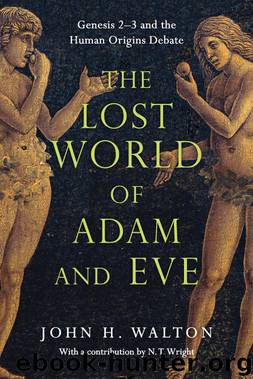The Lost World of Adam and Eve by John H. Walton

Author:John H. Walton [Walton, John H.]
Language: eng
Format: epub
ISBN: 9780830897711
Publisher: InterVarsity Press
Published: 2015-02-03T05:00:00+00:00
Proposition 15
Adam and Eve Chose to Make Themselves the Center of Order and Source of Wisdom, Thereby Admitting Disorder into the Cosmos
This is not the place to offer a full analysis of the nature of sin, law, accountability, guilt and punishment. These are matters of theology and would require a trained theologian to provide a credible treatment. The issues are complex, and the debate about the particulars can be traced throughout the entire history of the church.
The focus of this book is neither on the systematic theology of the church nor on trying to sort out the distinctions between, for example, Augustine and Pelagius or Irenaeus. Instead, we are exploring how Genesis 3 might have been understood against the backdrop of the ancient world and what claims are being made in this context. It is certainly important to eventually factor in what Paul has to say on the matter and to form our theology in deep interaction with the church fathers. But our starting point needs to be the text of Genesis itself in its cultural, literary and theological context.
As Mark Biddle points out, one of the most common ways that people think about sin today is as a crime, a view that Biddle considers to be inadequate biblically and theologically.1 In another book, Sin: A History, Gary Anderson investigates the competing paradigms of sin as a “burden to be borne” and sin as a “debt to be repaid.”2 The former metaphor, he contends, is the view supported by the idioms found in the Old Testament (“bearing sin/guilt/punishment,” as early as Cain’s statement in Gen 4:13). The latter imagery of debt becomes more prominent in the Second Temple period.3 These paradigms speak eloquently to the consequences of sin (burden, debt) and point the way to its resolution.
A second way that one could analyze sin is by the various Hebrew words that are used to express it.4 Here some caution is advisable. For example, it is not uncommon to encounter the statement that sin in the Old Testament means “missing the mark.” This kind of statement, unfortunately, exposes a misunderstanding of how semantics work. It is true that the verb ḥṭʾ can refer to failing to achieve an objective (Prov 8:36; Is 65:20) and is even used once for slingers who do not miss their target (Judg 20:16).5 There is no reason, however, to think of these uses as reflecting the “original” meaning of the word that is translated “sin.” The meanings of words are derived from their use, not from their etymology,6 and this verb simply means “to sin.” It is not necessarily limited to the idea of missing a mark or failing to achieve an objective.7 The words for sin can help us to recognize its various guises (rebellion, transgression, iniquity, guilt), but such semantic analysis can only take us so far.
In a third approach, others might talk about what sin does rather than what sin is. In this sort of investigation, sin can be seen as a threat to relationship with God—it results in alienation.
Download
This site does not store any files on its server. We only index and link to content provided by other sites. Please contact the content providers to delete copyright contents if any and email us, we'll remove relevant links or contents immediately.
The Lost Art of Listening by Michael P. Nichols(7494)
Why I Am Not A Calvinist by Dr. Peter S. Ruckman(4149)
The Rosicrucians by Christopher McIntosh(3510)
Wicca: a guide for the solitary practitioner by Scott Cunningham(3167)
Signature in the Cell: DNA and the Evidence for Intelligent Design by Stephen C. Meyer(3130)
Real Sex by Lauren F. Winner(3014)
The Holy Spirit by Billy Graham(2944)
To Light a Sacred Flame by Silver RavenWolf(2814)
The End of Faith by Sam Harris(2733)
The Gnostic Gospels by Pagels Elaine(2527)
Waking Up by Sam Harris(2454)
Nine Parts of Desire by Geraldine Brooks(2360)
Jesus by Paul Johnson(2352)
Devil, The by Almond Philip C(2324)
The God delusion by Richard Dawkins(2305)
Heavens on Earth by Michael Shermer(2278)
Kundalini by Gopi Krishna(2180)
Chosen by God by R. C. Sproul(2161)
The Nature of Consciousness by Rupert Spira(2104)
